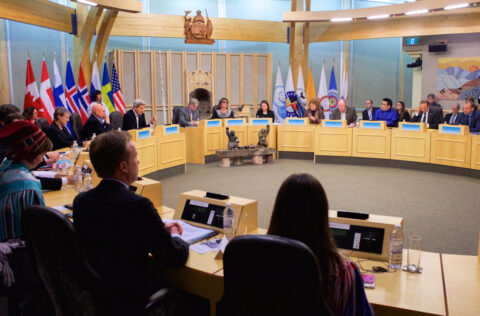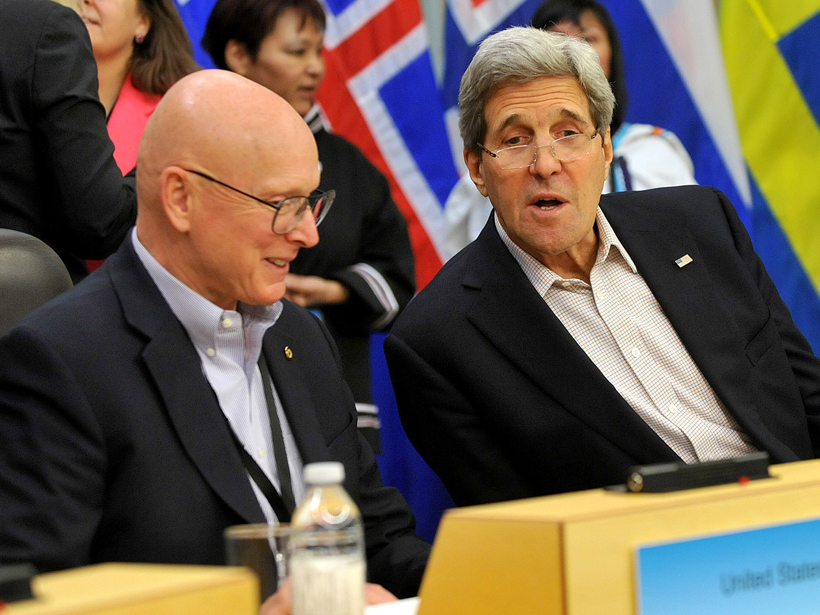The United States assumed the rotating 2-year chairmanship of the Arctic Council on 24 April with a pledge to address climate change.
Climate change in the Arctic “is not a future challenge. This is happening right now.”
U.S. Secretary of State John Kerry vowed that during its chairmanship, the United States “will work every single day with members of this council to help prepare Arctic communities for the impacts of [climate] change, and we’ll do everything we can to prevent even worse impacts in years to come.” He spoke at the council’s meeting in Nunavut Iqaluit, Canada, as the United States assumed the chairmanship of the organization.
Climate change in the Arctic “is not a future challenge. This is happening right now,” Kerry said. Temperatures in the Arctic “are increasing at more than twice the rate of the global average. What these rising temperatures mean is that the resilience of our communities and our ecosystems, the ability of future generations to be able to adapt and live and prosper in the Arctic the way people have for thousands of years, is tragically but actually in jeopardy.”
Focus on Climate Change and Other Key Issues

The U.S. chairmanship will focus on addressing climate change and its impacts; promoting ocean safety, security, and stewardship; and improving economic and living conditions for Arctic communities, Kerry said. The United States, he stated, also will build on progress made on environmental, economic, and other regional issues during the just-concluded Canadian chairmanship. The council, which is an intergovernmental forum to address Arctic regional issues, has eight member states, includes six indigenous organizations as permanent participants, and has more than 30 observer parties.
Officials at the meeting approved the council’s “Iqaluit Declaration 2015,” which acknowledges that reducing greenhouse gas emissions “continues to be the most important contribution to addressing global and Arctic climate change and to the long-term conservation and sustainability of the unique Arctic environment.”
Action on Black Carbon and Methane
The declaration implements a Framework for Action on Enhanced Black Carbon and Methane Emissions Reductions in the Arctic. It also encourages the creation of an enhanced elevation map of the Arctic “to provide improved information for use in scientific analysis and sustainable development.” In addition, the declaration calls for more awareness about ocean acidification, approves a strategic plan that provides a framework to protect ecosystems and promote sustainable development, and encourages efforts to sustain Arctic communities and build a stronger Arctic Council.
Kerry expressed U.S. support for these and other measures, stating that the United States “intends to press for the full implementation of the framework on black carbon and methane.” He also urged all Arctic Council members and observer nations to join the Global Ocean Acidification Observer Network, an international effort to better understand acidification. “The cold temperatures of the Arctic Ocean make it particularly vulnerable to acidification, science tells us,” Kerry said. “Despite all of this, incomprehensibly, ocean acidification is often an overlooked impact of climate change.”
Sustainable Development in a Fragile Region
Kerry applauded the council’s efforts on enhancing preparedness for oil spills and similar potential disasters, as well as its work to develop a pan-Arctic network of marine protected areas. He also expressed support for the Arctic Economic Council and efforts to help native communities.
“It is imperative that the development that we pursue is sensitive to the lifestyle and the history that people want to hold onto.”
“We’re very well aware that the retreat of sea ice in the region brings with it a lot of opportunities, though not everybody sees them in the same context as opportunities. Shipping lanes are already beginning to open, providing jobs and new possibilities for commercial enterprise,” he said. “It is imperative that the development that we pursue is sensitive to the lifestyle and the history that people want to hold onto.” Kerry added that efforts should ensure that development “is sustainable, that it doesn’t exacerbate other challenges in the Arctic and around the world.”
He continued, “We believe the private sector has a huge role to play in ensuring that we find the right balance, and we have an enormous role to play with the private sector in making sure that they adopt that role and live it out.”
Geopolitical Tensions
During separate press briefings following the meeting, Kerry and Canadian officials responded to questions about Russian military exercises in the Arctic, the hostilities in Ukraine, and whether these concerns could diminish the cooperative nature of the Arctic Council. Kerry said that military issues in the Arctic are legitimate concerns that need to be addressed at some point. However, he stressed that it is better to deal with them through NATO, the United Nations Security Council, or other forums rather than through the Arctic Council.
He said that during a conversation a few days earlier, Russian Foreign Minister Sergey Lavrov “made it crystal clear to me that Russia wants the council to be successful, that they want this to be a cooperative entity that is geared towards peaceful purposes, and that it’s their intent to cooperate with us on the protection of the environment on the agenda that we have set forth.”
Nonetheless, tensions remain high. Canadian Foreign Minister Robert Nicholson remarked during a press briefing that he told the Russian representative to the Arctic Council meeting that “Canada is there to support Ukraine for the long term. We condemn the Russian aggression against Ukraine.”
The Embassy of the Russian Federation in Canada responded on 24 April to the Canadian officials. “The Arctic Council ministerial that just wrapped up in Iqaluit was a productive and substantial event. It underscored achievements of the eight Arctic countries during the Canadian chairmanship, including the creation of the Arctic Economic Council,” the statement read. “Regrettably, driven by domestic policy agenda, the Canadian side attempted to promote at some point its misjudged approach to the current intra-Ukrainian conflict, which is alien to the Arctic Council as an international consensus forum. No wonder that participants of the event underscored the irrelevance of the politicization of the circumpolar cooperation. We believe the Arctic is a territory of dialogue, not a place for name-calling and reckoning political scores.”
—Randy Showstack, Staff Writer
Citation: Showstack, R. (2015), U.S. Goals for Arctic Council include focus on climate change, Eos, 96, doi:10.1029/2015EO029177. Published on 30 April 2015.
Text © 2015. The authors. CC BY-NC 3.0
Except where otherwise noted, images are subject to copyright. Any reuse without express permission from the copyright owner is prohibited.

